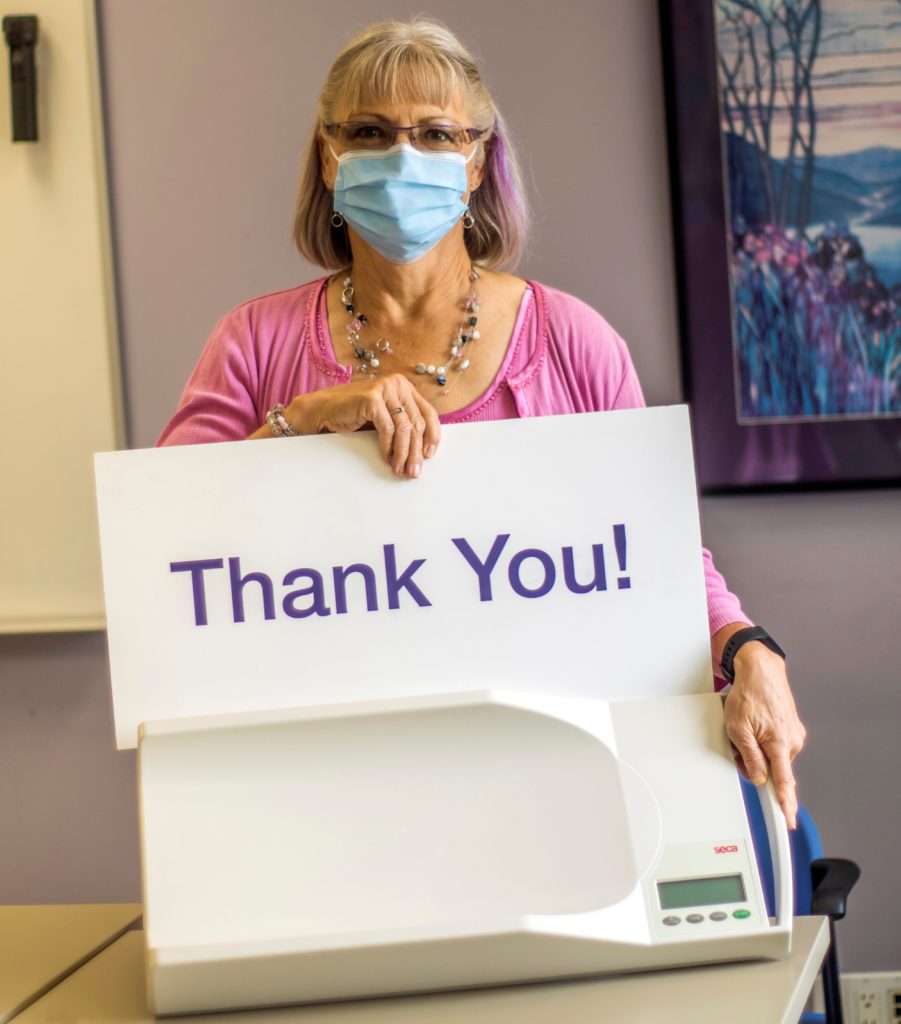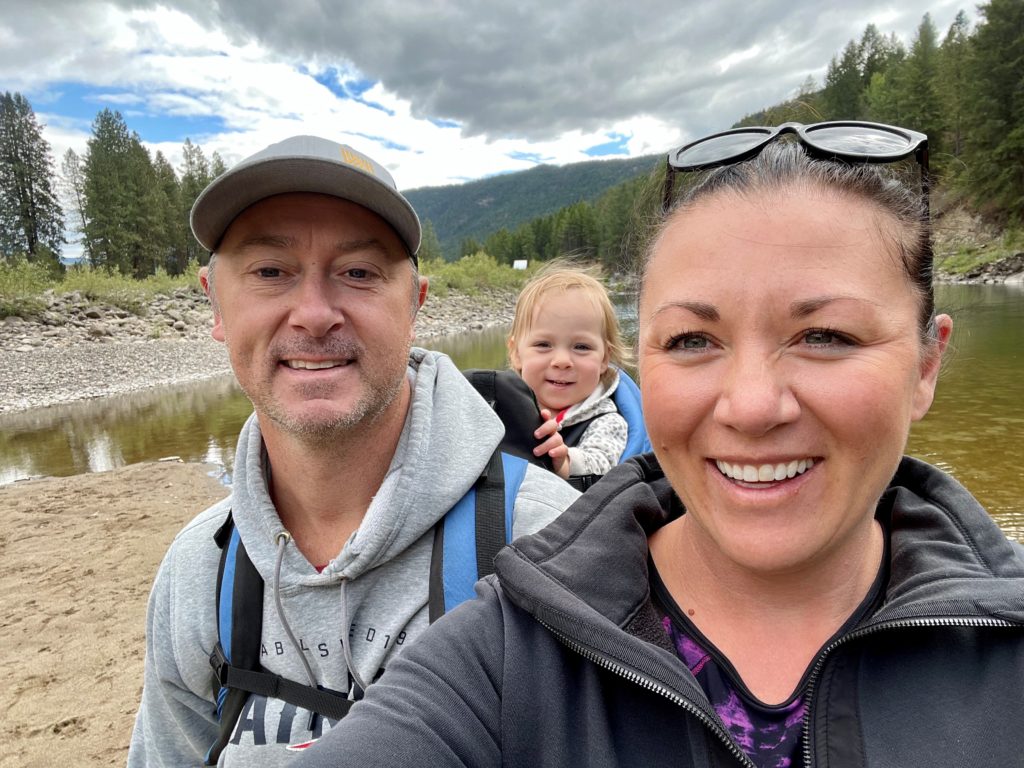Thank you for helping Calgary’s low birthweight newborns survive, thrive and stay healthy. A TELUS community investment grant has made it possible for Post Partum Community Services (PPCS) to expand its assistance so more families with premature newborns can access the new virtual care program. Your contribution to the Neonatal Transition Team (NTT), within the PPCS, helps families with newborns weighing under 1250 grams (2.75 pounds). After an extended stay in hospital, newborns need long-term follow-up to make sure their parents are equipped to care for them. Parents need guidance on feeding and care that is vital to their newborn’s survival. Thanks to your generosity, the NTT has increased the quality and efficiency of service to these very tiny clients while keeping them safe during the world pandemic.

Baby Addison was born three months early at only 1,134 grams (2.5lbs). She remained in hospital for 76 days where she was tube fed and needed assistance breathing. Her mother and father visited three times a day to help with her care. When Addison was able to breathe on her own and weighed just about five pounds, it was time to go home and for her family to come under the care of the NTT program.
Addison was among 17,000 babies and their families served by PPCS in Calgary the year she was born. She was also one of over 150 in a subgroup of very low birthweight newborns who needed extra special attention from NTT nurses. Addison and her parents were part of the pilot virtual care program where NTT staff attended appointments with their family via secure computer video conferencing. The timing couldn’t have been better. Addison arrived home just days before the COVID-19 pandemic which prompted The City of Calgary to declare a state of emergency. If the pilot hadn’t been in place, Addison’s visits to the clinic or by the nurse would have required layers of PPE and distancing, and there still would have been a risk of transmission of the virus.
A well-timed virtual pilot program for preemies
The fact that Addison, a pre-pandemic preemie discharged home in March 2020, was among the first newborns to benefit from virtual care was a happy coincidence according to Karen Lasby, Assistant Head Nurse and Team Lead, Neonatal Transition Team. While she acknowledges the timing was fortunate, Lasby points out the virtual care project was not developed to meet the demands of the pandemic. The idea was initiated in 2019 with the original goal to use video technology to increase efficiency for staff and clients while reducing costs, and still maintaining excellent care for infants and families.
“We have been providing neonatal transition services for 30 years in Calgary,” says Lasby. “We had been predominately doing clinic and home visits, which are costly. Since we deal with a relatively small number of babies, we’re always looking for innovative ideas and cost savings to make sure the program keeps going.”
After studying the increased availability of video conferencing and its application in healthcare, Lasby implemented the virtual care pilot in the three Calgary PPCS offices from March to May 2020. Nine digital scales in the PPCS inventory were loaned to families as an important assessment tool to track the newborn’s weight during each session. There were kick-off in-person visits by staff and, if families agreed, nurses substituted many home and clinic visits with virtual care via secure videoconferencing. The neonatal service included infant assessment, teaching around feeding, growth and development and other health challenges associated with prematurity and low birth weight.

Karen Lasby, Assistant Head Nurse and Team Lead, Neonatal Transition Team
17,000
newborns and their families served by PPCS in Calgary each year
NTT helps families with infants born weighing under
1250 grams (2.75 pounds)
It’s all about the scales
“The scales are a key tool to the program,” says Lasby. “The newborn’s weight is an important indicator of their general progress. That information is necessary and is part of the discussion with parents when we talk about feeding issues and make other observations during our video appointments. For example, I saw a newborn recently who was doing quite well, but I noticed the weight wasn’t great. It’s a flag for me to say, ‘I have to watch a feeding, and I will need to check in with the baby and parents again by Zoom later in the week.”
In another instance a mother was reluctant to leave her house with her small newborn in winter and during the pandemic. The newborn had a very poor growth trend despite the mother telling nurses that she was breastfeeding well and that she was following feeding plan recommendations. The scale was extremely important in tracking the newborn’s weight because, if the nurse only had mother’s verbal report, she would not have been able to determine that the newborn and mother needed additional timely care.
The virtual program, which is now a permanent part of care service, has resulted in many benefits to our staff and the newborns’ families, Lasby points out. We have reduced travelling for our staff which means much fewer time-consuming drives to appointments. Reducing clinic visits also means families no longer have to bundle up their tiny newborns for long drives to attend appointments. Everything happens at home via computer. Nurses are able to increase the number of appointments they can make in a day and can be more flexible to meet the needs of parents.
Coincidentally, the pilot project was initiated at the beginning of the COVID-19 pandemic, which facilitated continuation of quality care during the crisis. The virtual program has demonstrated positive health outcomes, improved access via more flexible appointment times, increased program capacity and has seen a 92 percent satisfaction rate among the families.
From pilot to permanent: thank you Telus!
Following the successful pilot project, the PPCS received a TELUS community investment grant to expand the number of scales available for loan to families. PPCS was able to purchase 36 additional scales thanks to the generousity of TELUS. The expanded scale inventory – from nine to 45 – facilitated dissemination of virtual care to an increased number of postpartum families whose newborns required closer and longer term follow-up.
Baby Addison’s mother, Carley Robertson, says she had the use of a scale for about three months. She put it to good use for NTT appointments as well as to provide her doctor with weight information over the phone. She says the NTT virtual visits were extremely helpful, particularly since she and her husband Chris Furlong, are first-time parents.
“It was more convenient than having to pack up your newborn and go to an appointment because when your baby is that new, it’s hard to get out of the house. That was a benefit. It just gave us confidence that she was doing well, and she was growing. It gave us comfort because, if we hadn’t been able to talk to the nurse, we would have been completely on our own.”
Thank you, on behalf of Addison, her parents Carley and Chris and hundreds of other families with vulnerable newborns. They come into the world struggling to breathe and to eat. Your generosity helps bring security and confidence to new parents, and strength and help to their infants. Support from TELUS has also resulted in increased efficiency and a cost saving to the health care system while maintaining a high quality of care for Calgary’s tiniest newborns. We appreciate your contribution to health care excellence and innovation in our community.

Your support, your impact
Three examples of the benefits of the NTT virtual programs during the pandemic:
- In the early months of COVID-19, pediatricians appreciated the enhanced and continuous care we could provide and relied on the communication with them as to a newborn’s progress.
- One of NTT’s families was in quarantine for two weeks. Full personal protective equipment (PPE) would have been required for a home visit. Instead, the follow-ups were carried out by Zoom, and the newborn did well.
- NTT received a call late on a Friday afternoon that a newborn was not feeding well. The family was unable to get an appointment with their doctor that day. The nurse did video conference and was able to identify several areas of concern. The newborn was able to avoid going to emergency and continued to feed well over the weekend.
Benefits of the virtual NTT program thanks to you:
- Families remain at home while still receiving quality care.
- Reduced risk of communicable infections for families, newborns and healthcare providers.
- Reduced need for staff travel; travel related savings in mileage and nursing time and elimination of safety risks associated with travel, e.g. winter driving.
- Improved access to care via more flexible appointment times.
- Increased program capacity.
In just seven months, your support of virtual appointments has saved:
- 50 hours nursing direct time
- 37 hours nurse travel time
- 1513 kilometers
- $763 travel expenses
Having support from donors like you is what makes milestones in healthcare possible. We are always inspired by the ways donors choose to embrace opportunities to enhance healthcare in our community. Support comes in many ways, but regardless of how you choose to do it, your support translates into the best care for our loved ones.


